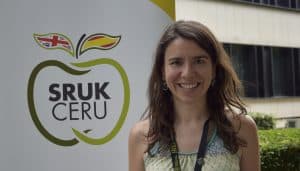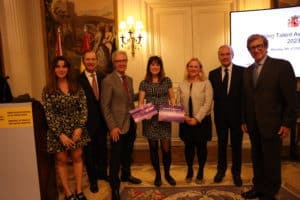That is the way we could define what happened on the 7th of July at the Spanish Researchers in the United Kingdom Society (SRUK) V Symposium. As every year, numerous Spanish researchers, who work or study in the UK, meet at London. This time, the occasion was even more special, as the fifth anniversary of SRUK was taking place. This year, more than ever, the appointment was unavoidable and the associates did not think twice. Nearly 200 members of SRUK attended this great celebration where not only was it possible to enjoy a magnificent atmosphere, but also dealt with many topics of great interest today, not only for researchers but also for the general public.
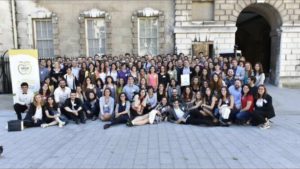
The symposium took place in London between 7th and 9th of July. As opening, a fantastic inauguration took place in the Embassy of Spain in the United Kingdom. After the welcoming words from the president of SRUK, Dr María Jiménez, we heard some words from the ambassador Mr Carlos Bastarreche, Mr Raimundo Perez-Hernandez y Torra, director of the Areces Foundation and our main sponsor, and the Secretary of State for Research, Development And Innovation Ms Carmen Vela, who highlighted the great work that SRUK does, “a job that is only yours, and that we only want to recognize and support”.
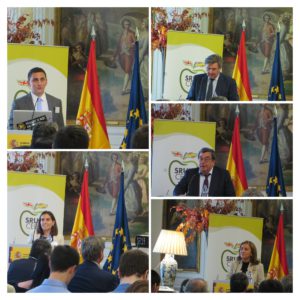
Subsequently, we were honoured to guest two magnificent talks from the hand of two great personalities from the Spanish scientific field, such as Dr. Mara Dierssen and Mr Pedro Duque. The speakers presented some ideas that explained, in simple way, aspects of their fields of investigation. Mr Pedro Duque explained the usefulness of performing experiments and studies at zero gravity showing that the combination of Science and microgravity helps a better understanding of basic physical aspects. Dr. Mara Dierssen told us about his research in the field of basic neuroscience focusing on the description of a gene related to Down syndrome. Both speakers, despite working in such disparate fields, agreed on the need for unconditional support for science by governments and society itself. Some members of the press department had the opportunity to talk with them later about how thank them for participating in the Symposium. They encouraging us to keep fighting and walking so that you can give Science its deserved place. Mara Dierssen also stressed the importance of continuing to fight for an improvement in the role of Women in Science, encouraging many of the attendees that we could talk to her to insist on it and fight for our careers.
On the occasion of our fifth anniversary, we were able to see a video with messages from our collaborators from other scientific societies, and then enjoy a magnificent round table with our presidents analysing the history and future of SRUK. During the cocktail afterwards, attendees had the opportunity to meet and talk with the speakers of the opening session as well as with other members of our Society of Spanish Scientists in the United Kingdom.
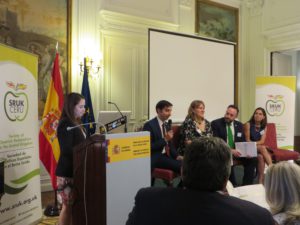
Continuing with the symposium, the following days offered the attendees excellent contents, such as the need to transmit and create a scientific culture and the struggle for gender equality. These sessions were held at Queen Mary University, one of the country’s most prestigious research and education centres. The sessions came loaded with many aspects of great importance, not only for the researchers but also for the general public.
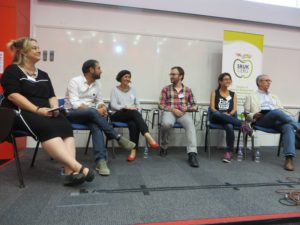
As the researcher becomes increasingly aware of the great importance of establishing a scientific culture in society in order to give science a privileged place in our country, as well as the advantage of being an indisputable tool in the development of society and in the national economy, one of the great points developed in this second day of symposium was the subject of scientific popularization. With the presence of leading groups in this field, such as BigVan, the scientific journalist Pere Estupinyà and Katherine Mathieson, director of the British Science Association (BSA), attendees received information, not only on what is really the disclosure Scientific and that is what it implies, but also could understand it as an alternative to research work in academia, being conceived as a new job option for many researchers. The roundtable was attended by the speakers of the session, who were joined by Susana de Lucas, director of the Press Department of CERU and Antonio Calvo of the AECC (Spanish Association of Scientific Communication). Pere Estupinyà stressed the importance of the DRUI, an acronym (in Spanish) for: Fun, Profitable, Useful and Interesting, as a strategy to choose projects or news that are intended to be treated or communicated to the public while Susana de Lucas reminded the audience very clearly about the outreach work that SRUK has been developing during these 5 years, through initiatives like this blog or the Radio show En fase Experimental. Thanks to the BSA representative, in this debate we had a vision of how scientific outreach works in the UK and, in short, everyone agreed on the importance of thinking about the type of audience, being close, simple and having the ability to Find the points of connection with the public. But above all, you have to be creative and a good storyteller, as the components of Big Van showed through their final monologue on science.

We cannot forget the great changes and risks that are experienced worldwide. The Global Challenges established by the United Nations. Issues such as sustainability, hunger or poverty, as well as diseases and natural resources were also discussed during various talks and debates throughout the morning of Saturday at this symposium, thus reflecting as Science and research are fundamental support to solve the problems that society is currently facing. Among the most outstanding names, we were able to count on the presence and testimonies of Professor Jonathan Davies, an expert in sociology and austerity; Professor Jenny Nelson FRS, who enlightened us on the current state of photovoltaic solar cell technology; Professor Natasha Howard, an expert on tropical diseases, who gave a very interactive talk; and Professor Marta Rivera Ferrer, with whom we talked about how to feed our overpopulated planet through the change in the model of agriculture, not increasing production.
On Saturday we closed the day with a fantastic dinner at the restaurant Hispania, SRUK members had the opportunity to interact and talk about what was discussed in the various sessions of the symposium while we could enjoy a Spanish dinner to erase any symptoms of homesickness for a few hours. There was no shortage of laughter, opportunities to make new contacts and friends, as well as the lack of dance, highlighting the magnificent intervention of our chief editor Maria Barreira to dance the fashion theme, Despacito. Because good science also has a good rhythm.
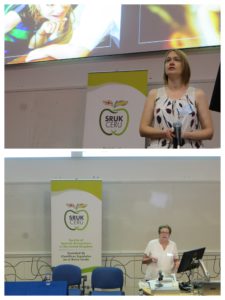
On Sunday, the annual meeting of the SRUK took place, only for members, where, apart from presenting our company’s annual report, the new board positions were elected Directive: Dr. Estrella Luna Díez, President; Dr. Javier Escudero, Vice-President; Dr. Nerea Alonso, rovin director; And Dr Maria Barreira, director of communications and the department of Online. After an intense weekend of exchanging opinions, on the third day of the symposium, we could not forget a question that is of great concern to the research community working in the United Kingdom, the so-called “BREXIT” that we have all heard of but nobody knows anything. Unfortunately it is very difficult to extract 100% complete information about what Brexit will bring to the Spanish and European researchers who are developing their projects in the United Kingdom. Through the vision of Dr. Claire McNulty of the British Council, attendees at the session were able to understand that Science in Britain is strong because it is very international, and the fact that despite this separation, the priority will always be in The researcher and his project, in opposition to the stage of the famous “Brexit means Brexit” that politicians and experts have been promoting after the referendum. Addressing other concerns in the field of research, Professor Eulalia Pérez Sedeño once again put on the table the problem of gender inequality in the academic world, focusing on its consequences, the Matilda effect. This talk gave rise to a very interesting discussion on the motives that make women disappear from the front line in science. This intense debate, which attracted the full attention of the audience, can continue in October at the round table organized by the SRUK delegation in Oxford.
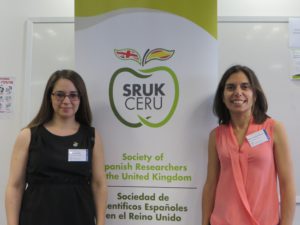
At the end of the sessions and seminars, participants were able to enjoy this symposium, participating in various workshops on scientific dissemination, science and creativity, development of scientific proposals for the ERC and Horizon2020 programs, and on entrepreneurship in Science. After these workshops, the awards ceremony for the best talk and best poster was given at the closing ceremony. Both were on the same person Roger Castells of the John Innes Research Center in Norwich (Cambridge Delegation) who had explained to us in 4 minutes the previous day and in a very compressible way, using a box of cookies as analogy, how we can create particles that only contain the virus wrapper.
We ended up in this way a weekend full of scientific activities. Attendees each returned to our cities of residence throughout the United Kingdom, leaving us with the memory of a few days where not only science, but the sense of connection, support and maturity, made the audience feel that despite the difficulties, the Spanish emigre scientist is not alone.
Special mention of these two writers to the organizing committee of the symposium, the press department and the online department for the great work done since everything was perfect. We are already looking forward to the symposium next year.
By Dr Laura Martínez Maestro (SRUK Oxford) and Dr Margarita Segovia Roldán (SRUK Yorkshire). Editors of this blog and members of the SRUK Press Department.


